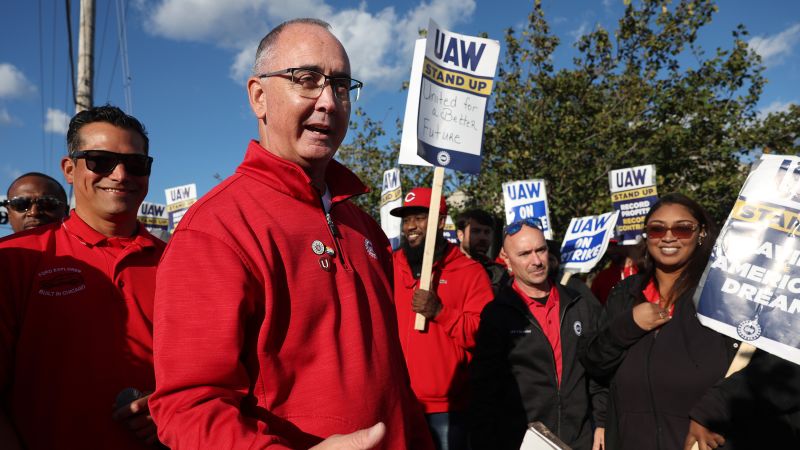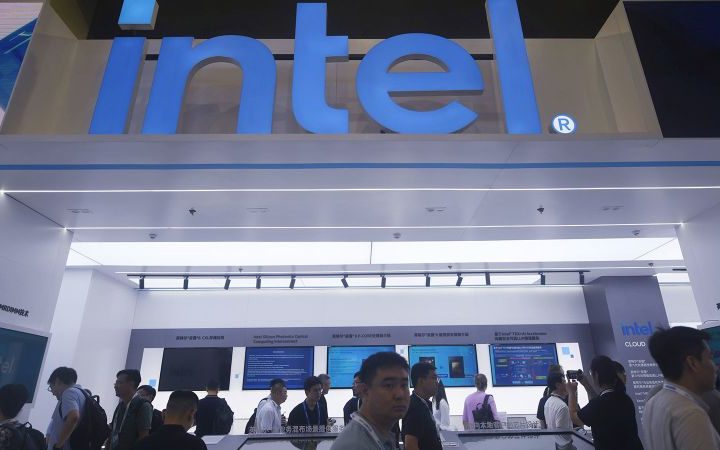Members of the United Auto Workers union are back on the job at General Motors, Ford and Stellantis. But the union’s leadership is already planning for the next strike against the nation’s unionized automakers. And it wants the strike to be even larger next time.
UAW President Shawn Fain said the union picked its April 30, 2028, expiration date for these tentative contracts in the expectation that there could be a coordinated strike starting on May 1, not just by UAW members but also members of other unions.
“We invite unions around the country to align your contract expirations with our own, so that together we can begin to flex our collective muscles,” he said in a recent message to members. “If we’re going to truly take on the billionaire class and rebuild the economy so that it starts to work for the benefit of the many, it’s important not only that we strike, but that we strike together.”
Nationwide strikes or strikes across numerous industries are common in Europe, said Todd Vachon, professor of labor relations at Rutgers University. But they are relatively rare in the United States. And there are many hurdles to Fain’s call for a coordinated national strike in 2028.
Part of the reason is that that the anti-labor Taft-Hartley Act of 1947, passed over the veto of President Harry Truman, put restrictions on the kinds of strikes US unions could wage. They can’t go on strike in sympathy with another union’s strike, and they can’t wage a strike over political issues, such as a change in government policy.
“What you see in France is when the government wants to increase the retirement age, every union walks out,” said Vachon.
And there is the problem that nearly half of US union members work for government employers, and many states have laws prohibiting public sector strikes. There are also severe limits on strikes in two of the most heavily unionized business sectors, airlines and railroads, which operate under a different labor law than that which controls labor relations for most private sector employees.
Most labor contracts also include no-strike clauses that prevent strikes during the life of the contract, which is the reason Fain was suggesting that unions try to line up their contract expirations.
Overall, only about 7% of private sector workers are represented by a union, according to data from the US Department of Labor. And many of the larger labor contracts already have different contact expirations.
The Teamsters’ contract reached with UPS this past summer, which covers about 340,000 members there, is due to expire on July 31, 2028. So it wouldn’t be allowed to join a May 1 general strike.
But the UAW doesn’t need to get all workers to walk out for for coordinated strikes to have an impact, said Kate Bronfenbrenner, director of Labor Education Research at Cornell University.
“He’s issuing a challenge to the labor movement. He’s saying, ‘We’re thinking big,’” she said. “He’s trying to inspire unions to do more. I think he did it as a call to action, even if it’s more ideal than reality.”
There is greater leverage when unions join together to negotiate new contracts, according to Bronfenbrenner.
But Vachon said collective action works best with a single employer or group of employers covered under the same contract, such as the recent strike at Kaiser Permanente by a coalition of unions representing 75,000 health care workers there.
The Teamsters and the UAW also both have members now on strike against a group of casinos in Detroit.
But a coordinated strike in unrelated industries would be far harder to pull off, especially if a union or unions in one industry achieved its bargaining goals before the others.
The date Fain sees for this collective, coordinated strike is May 1, 2028, or May Day, which is also International Workers Day. That is celebrated as a Labor Day in many other countries, but rarely in the United States, which is where its historical roots are.
May Day marks when Chicago labor organizers called a citywide strike in 1886 in an effort to win an eight-hour work day. When police moved to break up a labor protest in the city’s Haymarket Square on May 4, a bomb was thrown into a group of police, who responded by killing some of the protestors.
“There’s a whole debate as to what happened on May 4,” said Bronfenbrenner. “Was it thrown by someone in the labor movement or someone trying to discredit the movement? Nobody knows the answer.”
But strike leaders were charged with murder, even though many were not at the protest site. Some testified they were unaware of any plans to throw the bomb. But those charged were later convicted, and many were executed, becoming martyrs to the labor movement.
The day became celebrated by labor unions elsewhere, especially across Europe. But US unions were reluctant to embrace it, according to Vachon and Bronfenbrenner.
“Corporate America worked very hard to label May Day as an unpatriotric event. Unions were very worried about being labeled as un-American,” said Bronfenbrenner.
“It never got a strong foot hold here,” he said. “What foot hold it got here was lost in the McCarthy era since most of communist countries made it a national holiday.”
Fain has not shied away from rhetoric that critics accuse of being “radical” or “class warfare.” In one of the videos he recorded during the auto strike, the UAW president wore a t-shirt that read “Eat the Rich.” And he’s not shy about complaining about the “billionaire class” when making a call to action for members.
Any criticism of May Day is not likely to scare him away from embracing it.
Read the full article here







